Treatment recommendation for: Exacerbations & LAMA or LABA
Initiate a LABA/LAMA
OR
Consider a ICS + LABA if the patient's blood eosinophil count ≥ 0.3x109/L or blood eosinophil count ≥ 0.1x109/L AND ≥ 2 moderate
exacerbations or ≥ 1 exacerbation with hospitalisation
N.B. The LABA needs to be taken concurrently with an ICS due to the increased risk of death associated with LABA monotherapy for patients with
features of asthma.
One inhalation, once daily
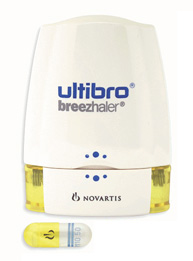
Two puffs, once daily. MDI delivered as a mist (non-propellant).
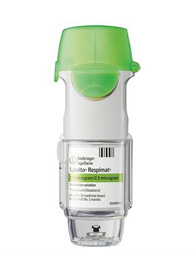
One inhalation, once daily
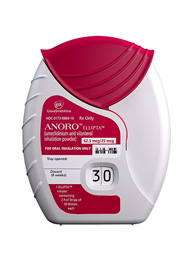
One inhalation, once daily
Fluticasone furoate 100 micrograms + vilanterol 25 micrograms (for COPD and asthma),
(NOTE: Fluticasone furoate 200 micrograms + vilanterol 25 micrograms is for asthma only)
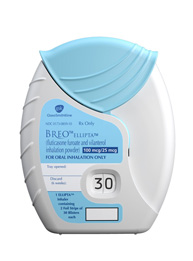
Two inhalations of 200 + 6 micrograms, twice daily OR One inhalation of 400 + 12 micrograms,
twice daily

Two puffs of 200 + 6 micrograms, twice daily
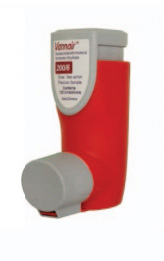
Fluticasone furoate 200 micrograms + vilanterol 25 micrograms is for asthma only
Budesonide is half as potent as fluticasone therefore equivalence requires twice the strength per dose
Fluticasone furoate 100 micrograms inhaled ONCE daily is approximately equivalent to fluticasone propionate 250
micrograms TWICE daily
Two inhalations of 200 + 6 micrograms, twice daily OR One inhalation of 400 + 12 micrograms,
twice daily
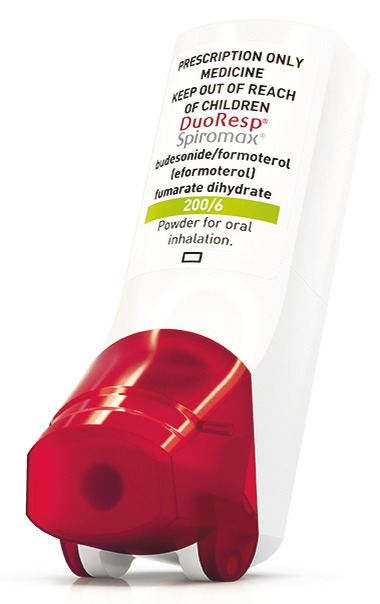
One inhalation of 250 + 50 micrograms, twice daily
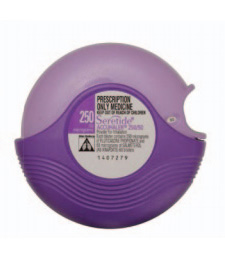
If additional inhaled corticosteroids (ICS) are required, change to the higher strength formulation or add a separate ICS
Treatment recommendation for: Exacerbations & LABA/LAMA
Consider escalating to triple therapy if the patient continues to have exacerbations (two or more per year) despite adherence and optimal inhaler technique (NZ COPD guidelines 2021). Triple therapy could be achieved with a LABA/LAMA + ICS (two inhalers; no Special Authority approval required for the ICS) or a LABA/LAMA/ICS (one inhaler; Special Authority approval required).
N.B. A beneficial response to an ICS may be expected to occur in patients with a blood eosinophil count > 0.1 x 109/L.
OR
Consider referral to a respiratory physician for the addition of long-term azithromycin (250 mg per day - not funded)
if the patient has a history of exacerbations and smoking.
One inhalation, once daily

Two puffs, once daily. MDI delivered as a mist (non-propellant).

One inhalation, once daily

Unapproved for use in patients with COPD
Unapproved for use in patients with COPD
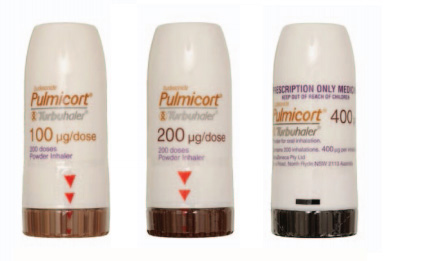
* The ICS examples listed here match those in available ICS + LABA combination inhalers. Beclomethasone would also be a reasonable option to select if a separate ICS is added to LABA/LAMA combination treatment (i.e. triple treatment).
One inhalation, once daily
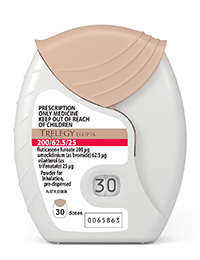
Two inhalations, twice daily
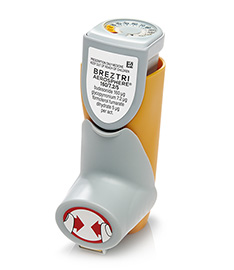
Treatment recommendation for: Exacerbations & ICS + LABA
Consider escalating to triple therapy. This could be achieved with either a LABA/LAMA + ICS (two inhalers; no Special Authority approval required for the ICS) or a LABA/LAMA/ICS (one inhaler; Special Authority approval required).
OR
Consider withdrawing the ICS and adding a LAMA if the patient is at high risk of pneumonia, there is a
lack of response to the ICS or the ICS is no longer considered appropriate
One inhalation, once daily

Two puffs, once daily. MDI delivered as a mist (non-propellant).

One inhalation, once daily

Unapproved for use in patients with COPD
Unapproved for use in patients with COPD

* The ICS examples listed here match those in available ICS + LABA combination inhalers. Beclomethasone would also be a reasonable option to select if a separate ICS is added to LABA/LAMA combination treatment (i.e. triple treatment).
One inhalation, once daily

Two inhalations, twice daily

One inhalation, once daily

One inhalation, once daily
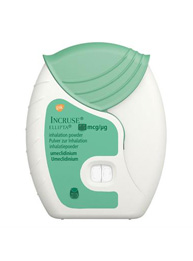
Two puffs, once daily. MDI delivered as a mist (non-propellant).
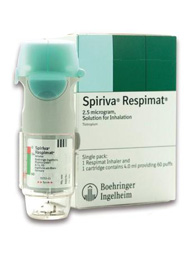
One inhalation, once daily
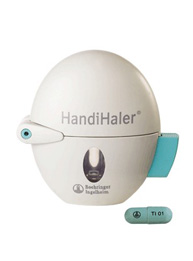
Reminder: Stop SAMA treatment when prescribing a LAMA
Treatment recommendation for: Exacerbations & LABA/LAMA + ICS
Assess inhaler technique and consider switching to single inhaler combination treatment if adherence is a concern (i.e. LABA/LAMA/ICS; Special Authority approval required)
OR
Consider de-escalating treatment by withdrawing the ICS if the patient is at high risk of pneumonia, there is a lack of response to the ICS or the ICS is
no longer considered appropriate;
OR
Consider referral to a respiratory physician for the addition of long-term azithromycin (250 mg per day – not funded) if the
patient has a history of exacerbations and smoking.
One inhalation, once daily

Two inhalations, twice daily

Treatment recommendation for: Breathlessness & LAMA or LABA
Initiate a LABA/LAMA
One inhalation, once daily

Two puffs, once daily. MDI delivered as a mist (non-propellant).

One inhalation, once daily

Treatment recommendation for: Breathlessness & LABA/LAMA
Investigate other potential causes of breathlessness, e.g. heart failure, and consider switching inhaler
devices or changing to a different combination long-acting inhaler;
OR
Consider escalating to triple therapy. This could be achieved with either a LABA/LAMA + ICS (two inhalers; no Special Authority approval required for the ICS) or a LABA/LAMA/ICS (one inhaler; Special Authority approval required).
However, consider the increased risk of pneumonia with regular ICS treatment (NZ COPD guidelines 2021).
One inhalation, once daily

Two puffs, once daily. MDI delivered as a mist (non-propellant).

One inhalation, once daily

Unapproved for use in patients with COPD
Unapproved for use in patients with COPD

* The ICS examples listed here match those in available ICS + LABA combination inhalers. Beclomethasone would also be a reasonable option to select if a separate ICS is added to LABA/LAMA combination treatment (i.e. triple treatment).
One inhalation, once daily

Two inhalations, twice daily

Treatment recommendation for: Breathlessness & LAMA + ICS
Consider escalating to triple therapy. This could be achieved with either a LABA/LAMA + ICS (two inhalers; no Special Authority approval required for the ICS) or a LABA/LAMA/ICS (one inhaler; Special Authority approval required).
OR
Consider withdrawing the ICS and adding a LAMA if the patient is at high risk of pneumonia, there is a lack of response to the ICS or the ICS
is no longer considered appropriate
One inhalation, once daily

Two puffs, once daily. MDI delivered as a mist (non-propellant).

One inhalation, once daily

Unapproved for use in patients with COPD
Unapproved for use in patients with COPD

* The ICS examples listed here match those in available ICS + LABA combination inhalers. Beclomethasone would also be a reasonable option to select if a separate ICS is added to LABA/LAMA combination treatment (i.e. triple treatment).
One inhalation, once daily

Two inhalations, twice daily

One inhalation, once daily

One inhalation, once daily

Two puffs, once daily. MDI delivered as a mist (non-propellant).

One inhalation, once daily

Reminder: Stop SAMA treatment when prescribing a LAMA
Treatment recommendation for: Breathlessness & LABA/LAMA + ICS
Investigate other potential causes of breathlessness, e.g. heart failure, and consider switching inhaler
devices or changing to a different combination long-acting inhaler;
OR
Consider withdrawing the ICS if the patient is at high risk of pneumonia, there is a lack of response
to the ICS or the ICS is no longer considered appropriate
One inhalation, once daily

Two puffs, once daily. MDI delivered as a mist (non-propellant).

One inhalation, once daily

Unapproved for use in patients with COPD
Unapproved for use in patients with COPD

* The ICS examples listed here match those in available ICS + LABA combination inhalers. Beclomethasone would also be a reasonable option to select if a separate ICS is added to LABA/LAMA combination treatment (i.e. triple treatment).
One inhalation, once daily

Two inhalations, twice daily

Treatment recommendation for: Exacerbations and breathlessness & LAMA or LABA
Initiate a LABA/LAMA
OR
Consider a ICS + LABA if the patient's blood eosinophil count ≥ 0.3x109/L or blood eosinophil count ≥ 0.1x109/L AND ≥ 2 moderate
exacerbations or ≥ 1 exacerbation with hospitalisation
N.B. The LABA needs to be taken concurrently with an ICS due to the increased risk of death associated with LABA monotherapy for patients with
features of asthma.
One inhalation, once daily

Two puffs, once daily. MDI delivered as a mist (non-propellant).

One inhalation, once daily

One inhalation, once daily
Fluticasone furoate 100 micrograms + vilanterol 25 micrograms (for COPD and asthma),
(NOTE: Fluticasone furoate 200 micrograms + vilanterol 25 micrograms is for asthma only)

Two inhalations of 200 + 6 micrograms, twice daily OR One inhalation of 400 + 12 micrograms,
twice daily

Two puffs of 200 + 6 micrograms, twice daily

Fluticasone furoate 200 micrograms + vilanterol 25 micrograms is for asthma only
Budesonide is half as potent as fluticasone therefore equivalence requires twice the strength per dose
Fluticasone furoate 100 micrograms inhaled ONCE daily is approximately equivalent to fluticasone propionate 250
micrograms TWICE daily
Two inhalations of 200 + 6 micrograms, twice daily OR One inhalation of 400 + 12 micrograms,
twice daily

One inhalation of 250 + 50 micrograms, twice daily

If additional inhaled corticosteroids (ICS) are required, change to the higher strength formulation or add a separate ICS
Treatment recommendation for: Exacerbations and breathlessness & LABA/LAMA
Consider escalating to triple therapy if the patient continues to have exacerbations (two or more per year) despite adherence and optimal inhaler technique (NZ COPD guidelines 2021). Triple therapy could be achieved with a LABA/LAMA + ICS (two inhalers; no Special Authority approval required for the ICS) or a LABA/LAMA/ICS (one inhaler; Special Authority approval required).
N.B. A beneficial response to an ICS may be expected to occur in patients with a blood eosinophil count > 0.1 x 109/L.
OR
Consider referral to a respiratory physician for the addition of
long-term azithromycin (250 mg per day - not funded) if the patient has a history of exacerbations and smoking.
One inhalation, once daily

Two puffs, once daily. MDI delivered as a mist (non-propellant).

One inhalation, once daily

Unapproved for use in patients with COPD
Unapproved for use in patients with COPD

* The ICS examples listed here match those in available ICS + LABA combination inhalers. Beclomethasone would also be a reasonable option to select if a separate ICS is added to LABA/LAMA combination treatment (i.e. triple treatment).
One inhalation, once daily

Two inhalations, twice daily

Treatment recommendation for: Exacerbations and breathlessness & ICS + LABA
Consider escalating to triple therapy. This could be achieved with either a LABA/LAMA + ICS (two inhalers; no Special Authority approval required for the ICS) or a LABA/LAMA/ICS (one inhaler; Special Authority approval required).
OR
Consider withdrawing the ICS and adding a LAMA if the patient is at high risk of pneumonia, there is a lack of response to the
ICS or the ICS is no longer considered appropriate
One inhalation, once daily

Two puffs, once daily. MDI delivered as a mist (non-propellant).

One inhalation, once daily

Unapproved for use in patients with COPD
Unapproved for use in patients with COPD

* The ICS examples listed here match those in available ICS + LABA combination inhalers. Beclomethasone would also be a reasonable option to select if a separate ICS is added to LABA/LAMA combination treatment (i.e. triple treatment).
One inhalation, once daily

Two inhalations, twice daily

One inhalation, once daily

One inhalation, once daily

Two puffs, once daily. MDI delivered as a mist (non-propellant).

One inhalation, once daily

Reminder: Stop SAMA treatment when prescribing a LAMA
Treatment recommendation for: Exacerbations and breathlessness & LABA/LAMA + ICS
Assess inhaler technique and consider switching to single inhaler combination treatment if adherence is a concern (i.e. LABA/LAMA/ICS; Special Authority approval required)
OR
Consider de-escalating treatment by withdrawing the ICS if the patient is at high risk of pneumonia, there is a lack of response to the ICS or the ICS is
no longer considered appropriate;
OR
Consider referral to a respiratory physician for the addition of long-term azithromycin (250 mg per day – not funded) if the
patient has a history of exacerbations and smoking.
One inhalation, once daily

Two inhalations, twice daily






